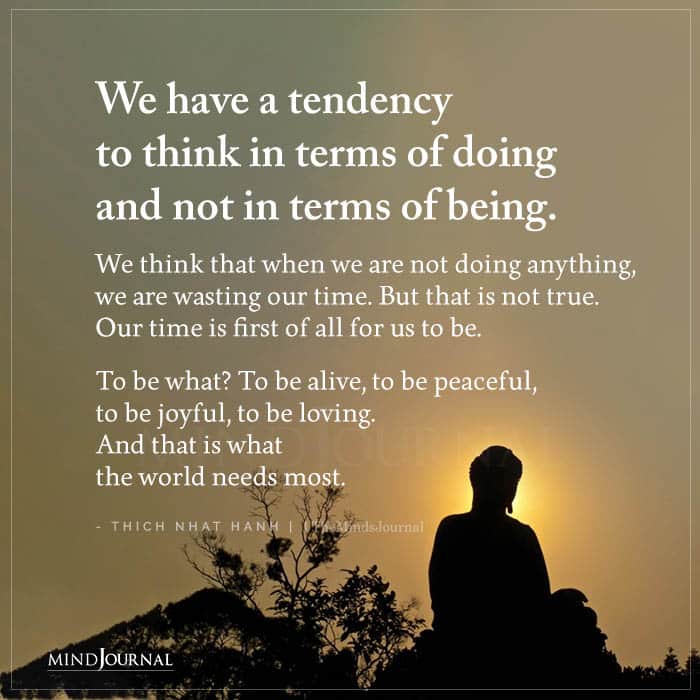We have a tendency to think in terms of doing and not in terms of being. We think that when we are not doing anything, we are wasting our time. But that is not true. Our time is first of all for us to be. To be what? To be alive, to be peaceful, to be joyful, to be loving. And that is what the world needs most.
– Thich Nhat Hanh
This quote by Thich Nhat Hanh, “We have a tendency to think in terms of doing and not in terms of being. We think that when we are not doing anything, we are wasting our time. But that is not true.
Our time is first of all for us to be. To be what? To be alive, to be peaceful, to be joyful, to be loving. And that is what the world needs most,” offers a profound insight into the essence of existence and the importance of mindfulness. Here’s a detailed breakdown of its meaning:
“We have a tendency to think in terms of doing and not in terms of being”:
Thich Nhat Hanh begins by highlighting a common societal mindset: the emphasis on action and productivity over presence and existence. Modern culture often values constant activity and achievement, equating busyness with success and worth. This perspective can lead individuals to focus on doing—completing tasks, achieving goals, and staying busy—at the expense of simply being. Being, in this context, refers to existing in the present moment, aware and content with one’s state of being.
“We think that when we are not doing anything, we are wasting our time”:
This statement addresses a widespread belief that inactivity equates to wasted time. Many people feel guilty or unproductive when they are not engaged in some form of action or task. This belief is rooted in the societal pressure to be constantly productive and to measure one’s value by the amount of work accomplished or the visible outcomes produced.
“But that is not true”:
Thich Nhat Hanh challenges this belief, asserting that it is a misconception. He invites us to reconsider the value of non-doing and to understand that time spent being is not wasted. This shift in perspective encourages a more balanced and holistic approach to life, where the state of being is appreciated and valued as much as, if not more than, the act of doing.
“Our time is first of all for us to be”:
Here, Thich Nhat Hanh emphasizes that our primary purpose is to exist—to be present and fully alive in each moment. This existence is not contingent on actions or achievements but is inherent and valuable in itself. This perspective aligns with the principles of mindfulness, which advocate for living fully in the present moment, aware and appreciative of the here and now.
“To be what? To be alive, to be peaceful, to be joyful, to be loving”:
Thich Nhat Hanh expands on what it means to be. It involves embracing life with awareness and presence. To be alive means to fully experience and appreciate the gift of existence. To be peaceful is to cultivate inner tranquility and harmony. To be joyful is to find happiness and contentment in the present moment. To be loving is to extend compassion and kindness to oneself and others. These qualities of being are essential for personal well-being and contribute positively to the world.
“And that is what the world needs most”:
Thich Nhat Hanh concludes by highlighting the broader significance of being. The world benefits greatly from individuals who are alive, peaceful, joyful, and loving. These qualities create a ripple effect, fostering a more compassionate, harmonious, and connected global community. By prioritizing being over doing, individuals can contribute to a more balanced and loving world.
In essence, this quote encourages a fundamental shift in perspective from doing to being. It invites us to recognize the intrinsic value of existence and to cultivate qualities that enhance our well-being and that of the world around us.
Moreover, Thich Nhat Hanh’s message underscores the importance of mindfulness and presence. By being fully present in each moment, we can experience life more deeply and authentically. This presence allows us to appreciate the simple joys of existence and to connect with others in meaningful ways.
This quote also serves as a reminder of the importance of self-compassion and balance. In a world that often prioritizes productivity and achievement, it is essential to take time to simply be. This balance fosters a healthier, more sustainable approach to life, where personal well-being is prioritized alongside external accomplishments.
Furthermore, Thich Nhat Hanh’s message encourages us to reflect on our own lives and the ways in which we can cultivate the qualities of being. By embracing mindfulness, peace, joy, and love, we can enhance our own lives and contribute to a more compassionate and connected world.
In conclusion, Thich Nhat Hanh’s quote offers a profound lesson on the importance of being over doing. It encourages a shift in perspective, valuing the present moment and the qualities that enhance our existence. By prioritizing being, we can live more mindfully and contribute to a more harmonious and loving world. This approach not only enriches our own lives but also creates a positive impact on the global community.
Read More: Powerful Thich Nhat Hanh Quotes: Remembering The Revered Zen Buddhist Monk
Thich Nhat Hanh Quotes, living buddha living christ, quote by thich nhat hanh, quote from thich nhat hanh, christ and buddha thich nhat hanh, buddha quotes, buddhism quote, buddhist sayings, buddha quotes on peace, best buddha quotes, short buddha quotes, Spiritual Quotes, spiritual quotes about life, short spiritual quotes, spiritual growth quotes, positive spiritual quotes, spiritual wisdom quotes, spiritual thoughts







Leave a Reply